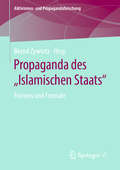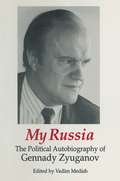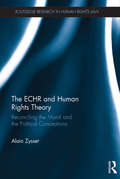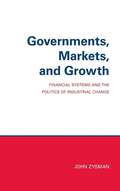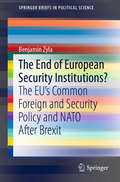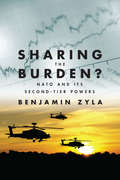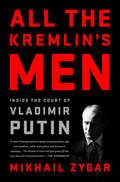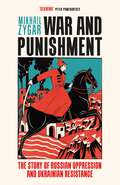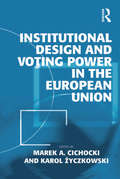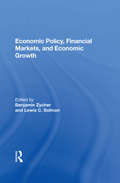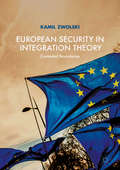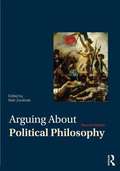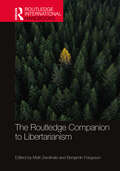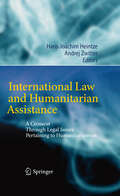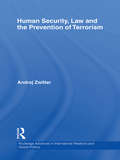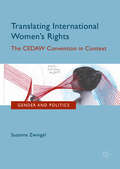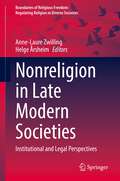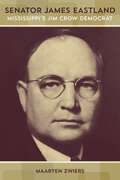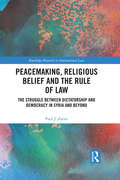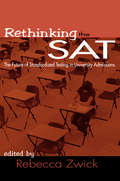- Table View
- List View
Propaganda des „Islamischen Staats“: Formen und Formate (Aktivismus- und Propagandaforschung)
by Bernd ZywietzDie Propaganda der terroristischen Miliz „Islamischer Staat“ hat für Aufsehen gesorgt und die Debatte um das Internet und vor allem das „Social Web“ als Risikotechnologie oder Gefahrenraum mitbestimmt. Dabei setzt der IS auf ein breites Spektrum medialer und gestalterischer Formen und Formate einer globalen, digitalen Medienkultur, um ein internationales Publikum zu erreichen: Online-Videos, anashid (Lieder) und Computerspiele; Internet-Meme, Social Media Posting oder Selfies. Der Sammelband gibt Einblick in die Bandbreite dieser jihadistischen Kommunikate, ihrer Ausdrucks- und Darstellungsweisen und zeigt dabei Möglichkeiten der Einordnung und der Auseinandersetzung auf.
My Russia: The Political Autobiography of Gennady Zyuganov
by Gennady Zyuganov Vadim MedishGennady Andreevich Zyuganov is the leader of Russia's resurgent Communist Party and was Boris Yeltsin's strongest challenger in the summer 1996 presidential elections. Although his face became familiar to the world at that time, his ideas and his programme were mainly a subject of speculation. A former village teacher from Orel Province, Zyuganov came to Moscow in the 1980s to work in the ideology department of the Communist Party of the Soviet Union and to complete doctoral work in philosophy at Moscow State University. He is a prolific writer who has rebuilt the Communist Party on his vision of a Russian socialist great power. Today he leads the Communist faction in the Duma and is chairman of the united opposition movement - the National Patriotic Union. This volume is a compilation of Zyuganov's writings on Russia's past and present and her place in the world; Russia's fate under the new leadership of Gorbachev and Yeltsin; his own vision of Russia's future under a new Communist leadership; and his reflections on the 1996 presidential election of the Communist Party of the Russian Federation.
The ECHR and Human Rights Theory: Reconciling the Moral and the Political Conceptions (Routledge Research in Human Rights Law)
by Alain ZyssetThe European Convention of Human Rights (ECHR) has been relatively neglected in the field of normative human rights theory. This book aims to bridge the gap between human rights theory and the practice of the ECHR. In order to do so, it tests the two overarching approaches in human rights theory literature: the ethical and the political, against the practice of the ECHR ‘system’. The book also addresses the history of the ECHR and the European Court of Human Rights (ECtHR) as an international legal and political institution. The book offers a democratic defence of the authority of the ECtHR. It illustrates how a conception of democracy – more specifically, the egalitarian argument for democracy developed by Thomas Christiano on the domestic level – can illuminate the reasoning of the Court, including the allocation of the margin of appreciation on a significant number of issues. Alain Zysset argues that the justification of the authority of the ECtHR – its prominent status in the domestic legal orders – reinforces the democratic process within States Parties, thereby consolidating our status as political equals in those legal and political orders.
Governments, Markets, And Growth: Financial Systems And Politics Of Industrial Change (Cornell Studies In Political Economy Series)
by John ZysmanThe deterioration in the economic performance of the advanced industrial democracies during the 1970s has provoked an intense debate about the role of government in economic adjustment and growth. In Governments, Markets, and Growth, John Zysman makes a significant contribution to our understanding of these critical international issues by demonstrating that there is a direct relationship between a nation's financial system and its government's ability to restart the growth engine. Professor Zysman argues that there are three distinct types of financial systems, each with different consequences for the political ties between financial markets, industry, and government. Zysman tests his argument by analyzing and comparing the patterns of industrial adjustment in five advanced nations. He contrasts the differing strategies of industrial adjustments primarily in France and Great Britain, but also in Japan, West Germany, and the United States. Governments, Markets, and Growth will be invaluable to the international banking and business community, a wide variety of government officials, and students of political science, economics, and business administration.
The End of European Security Institutions?: The EU’s Common Foreign and Security Policy and NATO After Brexit (SpringerBriefs in Political Science)
by Benjamin ZylaThis book discusses Brexit’s implications for the two most important security institutions in Europe, the EU’s Common Foreign and Security Policy (CFSP) and the North Atlantic Treaty Organization (NATO). While Brexit is still unfolding, this book asks what it would mean for the future embedding of the UK into CFSP and NATO, as well as how it will most likely affect the inner mechanics of the transatlantic alliance (NATO) and CFSP in particular, in the years to come. The book is divided into two parts. Part I provides a historical overview of the evolution of the relationships between the UK and NATO and the EU, respectively. Part II discusses the geopolitical contexts and potential impacts of Brexit, focusing on the contemporary security environment, as well as the options that the EU has, in the event an agreement is concluded. Using both predictive and normative arguments, this book provides likely scenarios for an event that continues to be a source of much uncertainty for the global community.Making an important contribution to one of the most important policy debates in international security affairs today, this book is of interest to students and researchers of international security affairs, European politics, and global governance as well as policymakers and practitioners working on the Brexit file.
Sharing the Burden?
by Benjamin ZylaSince the fall of the Berlin Wall, NATO's middle powers have been pressured into shouldering an increasing share of the costs of the transatlantic alliance. In Sharing the Burden? Benjamin Zyla rejects the claim that countries like Canada have shirked their responsibilities within NATO.Using a range of measures that go beyond troop numbers and defense budgets to include peacekeeping commitments, foreign economic assistance, and contributions to NATO's rapid reaction forces and infrastructure, Zyla argues that, proportionally, Canada's NATO commitments in the 1990s rivaled those of the alliance's major powers. At the same time, he demonstrates that Canadian policy was driven by strong normative principles to assist failed and failing states rather than a desire to ride the coattails of the United States, as is often presumed.An important challenge to realist theories, Sharing the Burden? is a significant contribution to the debate on the nature of alliances in international relations.
All the Kremlin's Men: Inside The Court Of Vladimir Putin
by Mikhail Zygar"I read this book in one night, truly a page-turner. It leaves a profoundly scary impression: [Putin's court is the] real House of Cards." --Lev Lurie, writer and historianAll the Kremlin's Men is a gripping narrative of an accidental king and a court out of control. Based on an unprecedented series of interviews with Vladimir Putin's inner circle, this book presents a radically different view of power and politics in Russia. The image of Putin as a strongman is dissolved. In its place is a weary figurehead buffeted--if not controlled--by the men who at once advise and deceive him.The regional governors and bureaucratic leaders are immovable objects, far more powerful in their fiefdoms than the president himself. So are the gatekeepers-those officials who guard the pathways to power-on whom Putin depends as much as they rely on him. The tenuous edifice is filled with all of the intrigue and plotting of a Medici court, as enemies of the state are invented and wars begun to justify personal gains, internal rivalries, or one faction's biased advantage.A bestseller in Russia, All the Kremlin's Men is a shocking revisionist portrait of the Putin era and a dazzling reconstruction of the machinations of courtiers running riot.
War and Punishment: The Story of Russian Oppression and Ukrainian Resistance
by Mikhail Zygar'History is made up of myths,' writes the renowned Russian dissident journalist Mikhail Zygar. 'Alas, our myths led us to the fascism of 2022. It is time to expose them.' Drawing from his perilous career investigating the frontiers of the Russian empire, Zygar reveals how 350 years of propaganda, bad historical scholarship, folk tales and fantasy spurred his nation into war with Ukraine.How did a German monk's fear of the Ottoman Empire drive him to invent the fiction of a united Russian world? How did corny spy novels about a 'Soviet James Bond' inspire Vladimir Putin to join the KGB? How did Alexander Pushkin's admiration for a poem by Lord Byron end with him slandering the legendary chief of the Cossacks? And how did Putin underestimate a rising TV comic named Volodymyr Zelensky, failing to see that his satire had become deadly serious, and that his country would be a joke no longer?A noted expert on the Kremlin with unparalleled access to hundreds of players in the current conflict - from politicians to oligarchs, gangsters to comedians (not least Zelensky himself) - Zygar chronicles the power struggles from which today's politics grew, and digs out the essential truths from behind layers of seductive legend. By surveying the strange, complex record of Russo-Ukrainian relations, War and Punishment reveals exactly how the largest nation on Earth lost its senses. A work of history can't undo the past or transform the present, but sometimes it can shape the future.In fact, that's how the story begins.
Institutional Design and Voting Power in the European Union
by Karol ZyczkowskiLeading global experts in the field of politics and mathematics bring forth key insights on how voting power should be allocated between EU member states, and what the policy consequences are of any given institutional design. Close attention is paid to the practical implications of decision-making rules, the nature and distribution of power, and the most equitable ways to represent the preoccupations of European citizens both in the Council and European Parliament. Highly theoretical and methodologically advanced, this volume is set to enrich the debate on the future of the EU's institutional design. A valuable source of information to scholars of political science, European studies and law, as well as to people working on game theory, theory of voting and, in general, applications of mathematics to social science.
Economic Policy, Financial Markets, And Economic Growth ([the Milken Institute Series In Economics And Education])
by Benjamin ZycherThe links between economic policy and economic growth are simultaneously obvious and obscure, with many factors interacting to influence the overall process. The list of relevant parameters affecting economic growth of interest to scholars and policymakers is lengthy and expanding. Although the importance of government policy is widely recognized,
European Security in Integration Theory: Contested Boundaries
by Kamil ZwolskiThis book examines federalism and functionalism – two fundamental, yet largely forgotten, theories of international integration. Following the recent outbreak of the war in Ukraine, policy practitioners and scholars have been in search of a deeper understanding of the likely causes of the conflict and its consequences for the European security architecture. Various theories have been deployed to this end, but international and European integration theory remains conspicuously absent. The author shows how the core tenets of integration theories developed after World War I, particularly how they viewed territoriality and geopolitical boundaries, remain as relevant today as they were almost 100 years ago.
Researching European Security Integration (The European Union in International Affairs)
by Kamil ZwolskiThis book provides new and established researchers with innovative methodologies and research strategies to explore European security integration from a different perspective, challenging traditional theoretical interpretations. It takes a step back from well-established theoretical approaches to the European Union’s (EU) Common Foreign and Security Policy (CFSP) and Common Security and Defence Policy (CSDP) to ask more fundamental questions about the core assumptions underpinning research on European security integration. It supports methodological innovations with an analysis of the most significant empirical problems of European security governance, including the war in Ukraine or the role of Russia in European security. In the last chapter, the author offers ideas for new pedagogical approaches to teaching European Studies.
The Individualists: Radicals, Reactionaries, and the Struggle for the Soul of Libertarianism
by Matt Zwolinski John TomasiA sweeping history of libertarian thought, from radical anarchists to conservative defenders of the status quoLibertarianism emerged in the mid-nineteenth century with an unwavering commitment to progressive causes, from women’s rights and the fight against slavery to anti-colonialism and Irish emancipation. Today, this movement founded on the principle of individual liberty finds itself divided by both progressive and reactionary elements vying to claim it as their own. The Individualists is the untold story of a political doctrine continually reshaped by fierce internal tensions, bold and eccentric personalities, and shifting political circumstances.Matt Zwolinski and John Tomasi trace the history of libertarianism from its origins as a radical progressive ideology in the 1850s to its crisis of identity today. They examine the doctrine’s evolution through six defining themes: private property, skepticism of authority, free markets, individualism, spontaneous order, and individual liberty. They show how the movement took a turn toward conservativism during the Cold War, when the dangers of communism at home and abroad came to dominate libertarian thinking. Zwolinski and Tomasi reveal a history that is wider, more diverse, and more contentious than many of us realize.A groundbreaking work of scholarship, The Individualists uncovers the neglected roots of a movement that has championed the poor and marginalized since its founding, but whose talk of equal liberty has often been bent to serve the interests of the rich and powerful.
Arguing About Political Philosophy (Second Edition)
by Matt ZwolinskiThis second edition of Arguing About Political Philosophy is the most complete, up-to-date, and interdisciplinary anthology of its kind. Its selections cover both classic philosophical sources such as Hobbes and Rousseau, and contemporary figures such as Robert Nozick and G. A. Cohen. But additional excerpts from economists, psychologists, novelists, and legal theorists help students from diverse intellectual backgrounds to connect with and appreciate the problems and distinctive methodology of political philosophy. This second edition also goes beyond any other anthology on the market in its coverage of traditionally under-represented views such as libertarianism, neo-socialism, feminism, and critical race theory. And it is one of the only anthologies to go beyond A Theory of Justice in its coverage of the political thought of John Rawls. The volume is divided into 3 parts - Foundational Concepts; Government, the Economy and Morality; and Applied Political Philosophy - covering core arguments and emerging debates in topics like: social contract theory political economy property rights freedom equality immigration global distributive justice The new companion website offers valuable resources for instructors and students alike, including sample quizzes, exams, and writing assignments, extensive study questions for each reading, and an online version of the "What's Your Political Philosophy" self-assessment.
The Routledge Companion to Libertarianism (Routledge International Handbooks)
by Matt ZwolinskiHave you ever wondered what libertarians think about vaccine mandates? About gun control? About racial and sexual inequalities? While libertarianism is well known as a political theory relating to the scope and justification of state authority, the breadth and depth of libertarian work on a wide range of other topics in social and political philosophy is less well known. This handbook is the first definitive reference on libertarianism that offers an in-depth survey of the central ideas from across philosophy, politics, and economics, including applications to contemporary policy issues. The forty chapters in this work provide an encyclopedic overview of libertarian scholarship, from foundational debates about natural rights theories vs. utilitarian approaches, to policy debates over immigration, punishment and policing, and intellectual property. Each chapter presents a comprehensive and up-to-date overview of historical and contemporary libertarian thought on its subject, and thus serves as an essential guide to current scholarship, and a starting place for discovering future lines of research. The book also contains a section on criticisms of libertarianism, written by leading scholars from the feminist, republican, socialist, and conservative perspectives, as well as a section on how libertarian political theory relates to various schools of economic thought, such as the Chicago, Austrian, Bloomington, and Public Choice schools. This book is an essential and comprehensive guide for anyone interested in libertarianism, whether sympathizer or critic.
International Law and Humanitarian Assistance
by Andrej Zwitter Hans-Joachim HeintzeIt is becoming increasingly apparent that there are major gaps in International Humanitarian Law and Public International Law in the area of humanitarian assistance. In response international organizations such as the UN and the EU are developing their own legal frameworks for humanitarian assistance and the body of customary law and so-called international disaster response law is growing steadily. This however shows that a coherent body of law is far from being a given. The legal reality of international law pertaining to emergency response is rather broadly spread over various international legal fields and related documents, covering situations of armed conflict and natural disasters. This book is one of the first attempts of linking different legal areas in the growing field of what could be called the international law of humanitarian assistance.
Human Security, Law and the Prevention of Terrorism (Routledge Advances in International Relations and Global Politics)
by Andrej ZwitterThis study examines two important questions regarding terrorism and political violence: which threats to human security constitute root causes for collective violence and which adequate responses for these root causes are available to the international community. The responses are examined on the basis of international law, in particular human rights law, and within the concept of human security, with the goal of fostering a long-term reduction in political violence. Drawing on existing political discussions and research about the root causes of terrorism, Zwitter develops a legal framework for the application of legal terrorism prevention tools. This study serves as a framework of action and analysis using concepts and particularly legal frameworks which are already broadly or universally recognized to increase the applicability of the framework without having to invent new legal regimes. In doing so it makes use of the concept of human security for tackling breeding grounds and other facilitators of terrorism making it universally accessible. Combining social science research with legal sociology and international law, this book will be of interest to students and scholars of politics, international relations, security studies, conflict studies and law.
Translating International Women's Rights
by Susanne ZwingelThis book looks at the centerpiece of the international women's rights discourse, the Convention on the Elimination of all Forms of Discrimination against Women (CEDAW), and asks to what extent it affects the lives of women worldwide. Rather than assuming a trickle-down effect, the author discusses specific methods which have made CEDAW resonate. These methods include attempts to influence the international level by clarifying the meaning of women's rights and strengthening the Convention's monitoring procedure, and building connections between international and domestic contexts that enable diverse actors to engage with CEDAW. This analysis shows that while the Convention has worldwide impact, this impact is fundamentally dependent on context-specific values and agency. Hence, rather than thinking of women's rights exclusively as normative content, Zwingel suggests to see them as in process. This book will especially appeal to students and scholars interested in transnational feminism and gender and global governance.
Nonreligion in Late Modern Societies: Institutional and Legal Perspectives (Boundaries of Religious Freedom: Regulating Religion in Diverse Societies)
by Anne-Laure Zwilling Helge ÅrsheimThis volume presents results from new and ongoing research efforts into the role of nonreligion in education, politics, law and society from a variety of different countries. Featuring data from a wide range of quantitative and qualitative studies, the book exposes the relational dynamics of religion and nonreligion. Firstly, it highlights the extent to which nonreligion is defined and understood by legal and institutional actors on the basis of religions, and often replicates the organisation of society and majority religions. At the same time, it displays how essential it is to approach nonreligion on its own, by freeing oneself from the frameworks from which religion is thought.The book addresses pressing questions such as: How can nonreligion be defined, and how can the “nones” be grasped and taken into account in studies on religion? How does the sociocultural and religious backdrop of different countries affect the regulation and representation of nonreligion in law and policymaking? Where and how do nonreligious individuals and collectives fit into institutions in contemporary societies? How does nonreligion affect notions of citizenship and national belonging? Despite growing scholarly interest in the increasing number of people without religion, the role of nonreligion in legal and institutional settings is still largely unexplored.This volume helps fill the gap, and will be of interest to students, researchers, policymakers and others seeking deeper understanding of the changing role of nonreligion in modern societies.
Hiroshima
by Ran ZwigenbergIn 1962, a Hiroshima peace delegation and an Auschwitz survivor's organization exchanged relics and testimonies, including the bones and ashes of Auschwitz victims. This symbolic encounter, in which the dead were literally conscripted in the service of the politics of the living, serves as a cornerstone of this volume, capturing how memory was utilized to rebuild and redefine a shattered world. This is a powerful study of the contentious history of remembrance and the commemoration of the atomic bomb in Hiroshima in the context of the global development of Holocaust and World War II memory. Emphasizing the importance of nuclear issues in the 1950s and 1960s, Zwigenberg traces the rise of global commemoration culture through the reconstruction of Hiroshima as a 'City of Bright Peace', memorials and museums, global tourism, developments in psychiatry, and the emergence of the figure of the survivor-witness and its consequences for global memory practices.
Senator James Eastland: Mississippi's Jim Crow Democrat (Making the Modern South)
by Maarten ZwiersIn the years following World War II, the national Democratic Party aligned its agenda more and more with the goals of the civil rights movement. By contrast, a majority of southern Democrats remained as committed as ever to a traditional, segregationist ideology. Through the career of Senator James Eastland, one of the mid-century's most prominent politicians, author Maarten Zwiers explores the uneasy, yet mutually beneficial relationship between conservative southerners and the increasingly liberal party to which they belonged. Mississippi Democrat James "Big Jim" Eastland began an influential four-decade career in the United States Senate in 1941, ultimately rising to become president pro tempore of the Senate, a position that placed him third in the line of presidential succession. His reputation for toughness developed from his unfailing and ruthless opposition to greater civil rights and his concern over the global spread of communism, as he believed participants in the two movements were working together to undermine the American way of life. Zwiers contends that despite Eastland's extreme positions, he still managed to maintain influence through productive relationships with his Senate colleagues-liberal as well as conservative. Though the progressive wing of the Democratic Party continued to push for stronger civil rights legislation, they valued compromise with southern senators like Eastland in order to ensure support from a region the Democrats could ill afford to lose. While Eastland's campaigning rhetoric was inflammatory, his ability to operate within the national political structure by leveraging moderate concessions contributed to his lengthy and effective career. Drawing on recently opened archival records, Maarten Zwiers offers a nuanced portrait of a man frequently portrayed as a southern zealot. Senator James Eastland provides a case study of the complicated relationship between party and party members that allowed Democrats to maintain power in the South for much of the twentieth century.
Peacemaking, Religious Belief and the Rule of Law: The Struggle between Dictatorship and Democracy in Syria and Beyond (Routledge Research in International Law)
by Paul J. ZwierThis book offers a new way of understanding the role of the mediator in teaching parties the interrelationship between sustainable peace, forgiveness, and international justice. It argues that the arrival of social media presents new opportunities for reaching sustainable peace agreements, through their use in gathering the detailed information that can match victims and perpetrators of past atrocities. The author aims to advance a more expansive understanding of the subjects and limitations of making peace in the shadow of international law by examining the concepts of mediation and forgiveness that exist alongside law. To that end, the book offers an account of the role of the mediator that emerges from the interplay between Ricouerian imagination and forgiveness and predicts ever-greater opportunities for making peace and protecting human rights that can be facilitated by a harnessing of social media as a tool for making peace with justice. The author also aims to examine how strategies for sustaining the peace must combat the inevitable frustrations with democracy that can lead to a slide into dictatorship. Assad, Obama, and the UN leadership and their decisions concerning making and maintaining peace in Syria are used as case studies to examine the interplay between a leaders’ religious beliefs, faith in democracy and rule of law, and impulses towards totalitarianism.
Principled Negotiation and Mediation in the International Arena
by Paul J. ZwierThis book argues that it can be beneficial for the United States to talk with 'evil' – terrorists and other bad actors – if it engages a mediator who shares the United States' principles yet is pragmatic. It shows how the US can make better foreign policy decisions and demonstrate its integrity for promoting democracy and human rights, by employing a mediator who facilitates disputes between international actors by moving them along a continuum of principles, as political parties act for a country's citizens. This is the first book to integrate theories of rule of law development with conflict resolution methods, and it examines ongoing disputes in the Middle East, North Korea, South America and Africa. It draws on the author's experiences with The Carter Center and judicial and legal advocacy training to provide a sophisticated understanding of the current situation in these countries and of how a strategy of principled pragmatism will give better direction to US foreign policy abroad.
Rethinking the SAT: The Future of Standardized Testing in University Admissions
by Rebecca ZwickRethinking the SAT is a unique presentation of the latest thoughts and research findings of key individuals in the world of college admissions, including the president of the largest public university system in the U.S., as well as the presidents of the two companies that sponsor college admissions tests in the U.S. The contributors address not only the pros and cons of the SAT itself, but the broader question of who should go to college in the twenty-first century.
Who Gets In?: Strategies for Fair and Effective College Admissions
by Rebecca ZwickOn the disputed topic of U.S. college admissions, everyone agrees that this high-stakes competition is unfair. But few agree on what a fair process would be. Stressing transparency in evaluating applicants, Rebecca Zwick assesses the goals and criteria of different admissions policies and shows how they can fail to produce the desired results.
